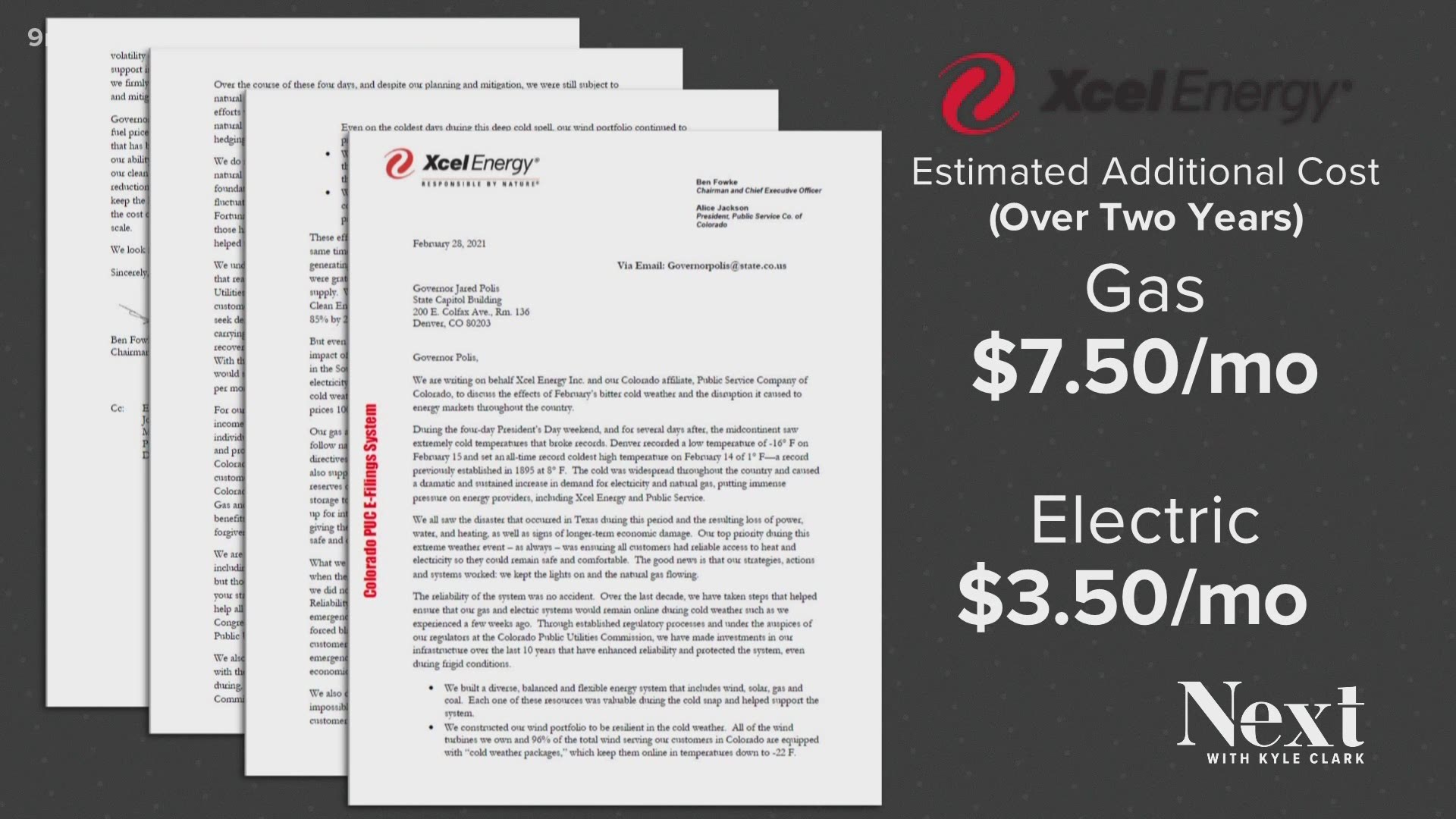DENVER — Xcel Energy customers could be charged an additional $264 for gas and electric spread out over two years as a result of the cold weather in mid-February.
The Colorado Public Utilities Commission (PUC) is investigating the decision by multiple Colorado energy companies, including Xcel, to purchase high-priced natural gas when it was upwards of 100 times the usual price.
RELATED: Energy regulators investigate if Coloradans were charged inflated prices during Texas power crisis
In a filing for investors last month, Xcel reported that it spent an extra $650 million in electricity and natural gas fuel costs in February.
In a letter filed with the PUC and sent to Gov. Jared Polis (D-Colorado) on Sunday, Xcel explained that the company would spread out the charges over 24 months, and that "typical residential customers would see an additional fuel charge of less than $7.50 per month for our gas customers and $3.50 per month for our electric customers."
For customers who receive both electric and natural gas from Xcel, that would be about $11 per month for two years.
The letter was signed by Xcel CEO Ben Fowke, and Alice Jackson, the president of Xcel's Colorado operations.
They wrote that normally these charges would be recovered in a single quarter, meaning three months, not two years.
> Video above: Watch a previous Next with Kyle Clark report about possible Xcel price increases.
The executives also wrote that the company would be seeking help from Washington D.C. to limit the cost to customers.
"We are also seeking assistance from Congress and the Biden Administration. Federal dollars – including LIHEAP funds – could help defray the costs that we incurred on our customers’ behalf, but those are available only with the support of our states," the Xcel executives wrote.
In a statement last week, Polis encouraged the PUC investigation, which was already underway, and called on utility companies to notify customers and allow them to opt into rolling blackouts to avoid high costs.
In the letter to the governor, Xcel detailed the steps it took to reduce usage.
"We drew on gas storage to reduce our exposure to the gas market. We interrupted our gas customers that are signed up for interruptible service. And finally, we provided our customers with conservation messages, giving them practical information on how they could reduce their gas and electric costs while staying safe and comfortable in the cold weather," the Xcel executives wrote.
The letter continued with what Xcel did not attempt.
"What we did not do was implement reliability-based conservation appeals—a step we take only when there are impending forced outages," the Xcel executives wrote. "Although we take seriously the impact of high prices on our customers, it is important to save tools like reverse 911 calls for the most significant system emergencies. These system emergencies relate to outages and safety, not market price volatility and economics."
The executives also wrote that individual, voluntary blackouts are not an option."
"They are physically impossible. Our system does not allow us to go house-by-house and turn off service based on customer preference for a few hours at a time," Xcel wrote.
Attached to the letter were emails to news stations, including 9NEWS, regarding cold weather tips. The email to 9NEWS was in response to a phone call from our assignment desk asking if the extreme cold on Feb. 14 was affecting Xcel's operations, since other companies, like Platte River Power Authority, were asking customers to conserve.
"Any volunteer conservation by customers in these types of prolonged and widespread low temperatures is beneficial to the system as a whole," Xcel replied. "When one of our other utilities in the state issues a conservation message or reaches out for help, we do our best to support them and our Colorado system as much as possible."
The reply continued with tips for how customers can conserve.
Xcel also said that it saved customers $1 billion over those four cold days by hedging prices for natural gas and electricity. Hedging means locking in future consumption at a pre-determined set price.
Of the natural gas used over those four days, Xcel said that 64% was hedged, while 21% of the gas required to generate electricity was hedged. That means 34% and 79%, respectively, were exposed to the price at that given time.
"We do not profit from natural gas prices. The cost of fuel for electricity generation or the local natural gas distribution system is passed on directly to our customers without markup," Xcel said.
In the letter, the executives also said that the company's wind options provided 5% to 21% of the electricity that its customers used.
"When wind disappeared from the system, we were grateful that we had natural gas and coal fired generation available to ensure a reliable energy supply. We will continue to need natural gas-fired generation even as we implement our Colorado Clean Energy Plan to retire much of our coal fleet and reduce carbon dioxide emissions an estimated 85% by 2030," Xcel wrote.
SUGGESTED VIDEO: Full Episodes of Next with Kyle Clark

